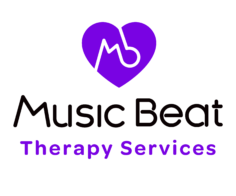Music Therapy is recognised by the NDIS
One of the ways music therapy has been funded for many of our clients over the past few years is through the Australian Government’s National Disability Insurance Scheme (NDIS).
The NDIS is for eligible Australians who were either born with or acquire a permanent and significant disability. A ‘permanent disability’ means a person’s disability is likely to be lifelong. A ‘significant disability’ means a disability with a large impact on a person’s ability to complete everyday activities.
Music therapy is recognised as a support for “Capacity Building – Improved Daily Living” through the NDIS as it targets improving and building the necessary skills that assist in everyday life.
Music therapy is a research-based practice and deemed as an essential service (particularly during COVID), providing opportunities for people of all ages and backgrounds to engage in improving their well-being through the naturally social medium of music.
The NDIS recognises music therapy as an effective service and has significantly improved access for the broader community.
This can include, however is not limited to:
- Language and communication skills: improving speech, language and sound processing, and nonverbal communication using a PODD (or Pragmatic Organisation Dynamic Display), signing, or other
- Gross and fine motor skills: coordination, body awareness, and mobility
- Social skills: turn taking, sharing, waiting
- Mental health support: developing coping resources, supporting healthy self-expression, and exploring and processing thoughts, feelings, and emotions
Music Beat Therapy Services is an NDIS Registered provider
Music Beat Australia (of which Music Beat Therapy Services is a division) underwent a rigorous process in 2020 to become a certified NDIS registered provider.
In July 2021 we received confirmation from the NDIS Commission that Music Beat Australia has been approved to be an NDIS registered provider.
This is a great outcome and reflects our commitment to achieving the requirements of the NDIS Practice Standards and reflects our commitment to providing our clients with the very best of services.
In a certification audit, providers are assessed against the NDIS Practice Standards and therefore held accountable to the highest possible clinical and service standards.
NDIS registered providers must meet “strict government quality and safety measures” and can provide services to clients that self-manage, or have agency-managed funding (NDIA).
The registration ensures that Music Beat Therapy Services provides consistently high-quality, best practice, and safe services to our clients.
As service access evolves, client needs change, and research informing music therapy practices improves – everyone at Music Beat Therapy Services feels that it is essential that our practice reflects that and being registered with NDIS ensures continuous improvement and development.
Music therapy clinical standards and the NDIS
To provide music therapy services in Australia (and receive funding from the NDIS), music therapists must be registered with the Australian Music Therapy Association (AMTA).
This requires a tertiary degree in music therapy, currently offered as a Masters level degree in Australia, as well as meeting the AMTA requirements such as placement experience, subject knowledge, a Police Check, along with ongoing professional development.
A Registered Music Therapist (RMT) is trained in using music to support non-musical goals that support and improve the physical, emotional, psychological wellbeing of people of all ages and diagnoses. When an RMT meets a new client, they conduct a thorough assessment on their:
- Motor skills
- Communication and language skills
- Cognitive skills
- Social/emotional skills
- Sensory needs
After the assessment period, our RMTs will set goals and objectives that align with the client’s NDIS goals to support them in providing consistent and holistic therapy.
A support plan is often written in conjunction with the therapy goals to provide evidence for how our RMTs will approach working towards the goals outlining various music therapy techniques. Once the music therapy program has commenced, our RMTs will document progress after each session and will report to the client, family, or support system.
This often occurs annually through a music therapy progress report directed to the NDIS to provide evidence for how music therapy has supported the continued building of daily living skills.
To find out more about music therapy and the NDIS please visit:
Australian Music Therapy Association
What is Music Therapy
National Disability Insurance Scheme
National Disability Insurance Scheme
